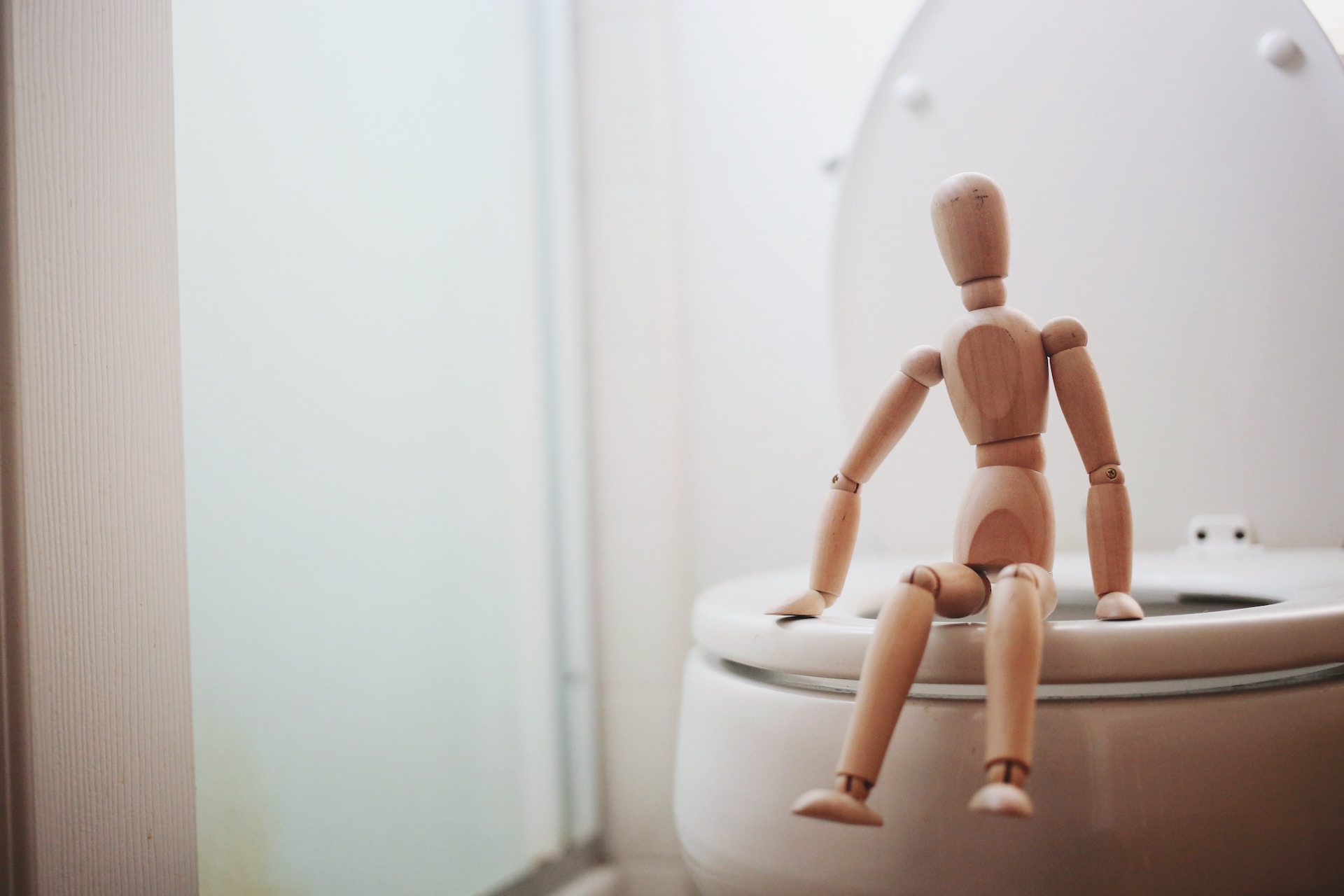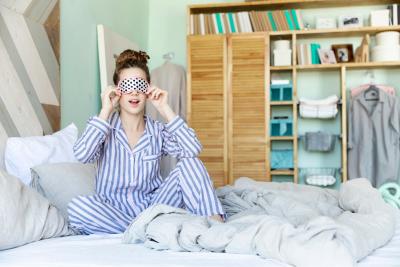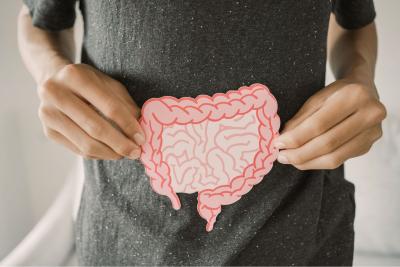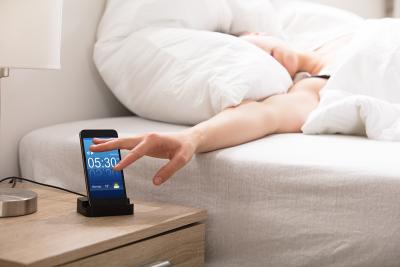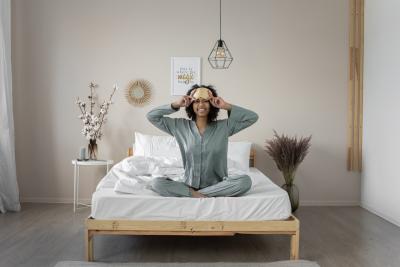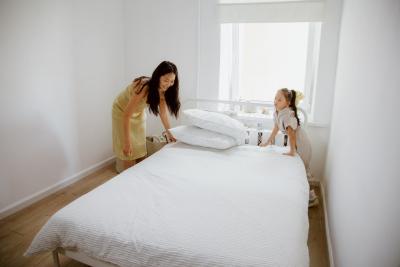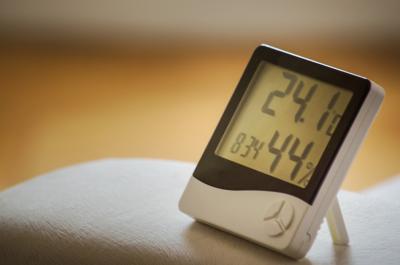You may not have heard of nocturia, but if you have woken up at night to go to the toilet multiple times, you’ve experienced it! Getting up to urinate during the night - nocturia - is often a huge cause of disrupted sleep, particularly if you wake up every few hours.
But you are not alone!
We've polled the nation to uncover how many people experience nocturia before working with our in-house sleep psychologist, Dr Kathrine Hall, at Somnus Therapy, to share her top tips for reducing the number of trips to the bathroom at night.
What is nocturia?
Nocturia is when you frequently wake up at night with the need to go to the toilet. To understand how many people regularly wake at night to go to the toilet, we conducted a poll to investigate how common it is. Our findings revealed that a third (32%) said they often get up at night to wee, indicating that many people could suffer from impacted sleep.
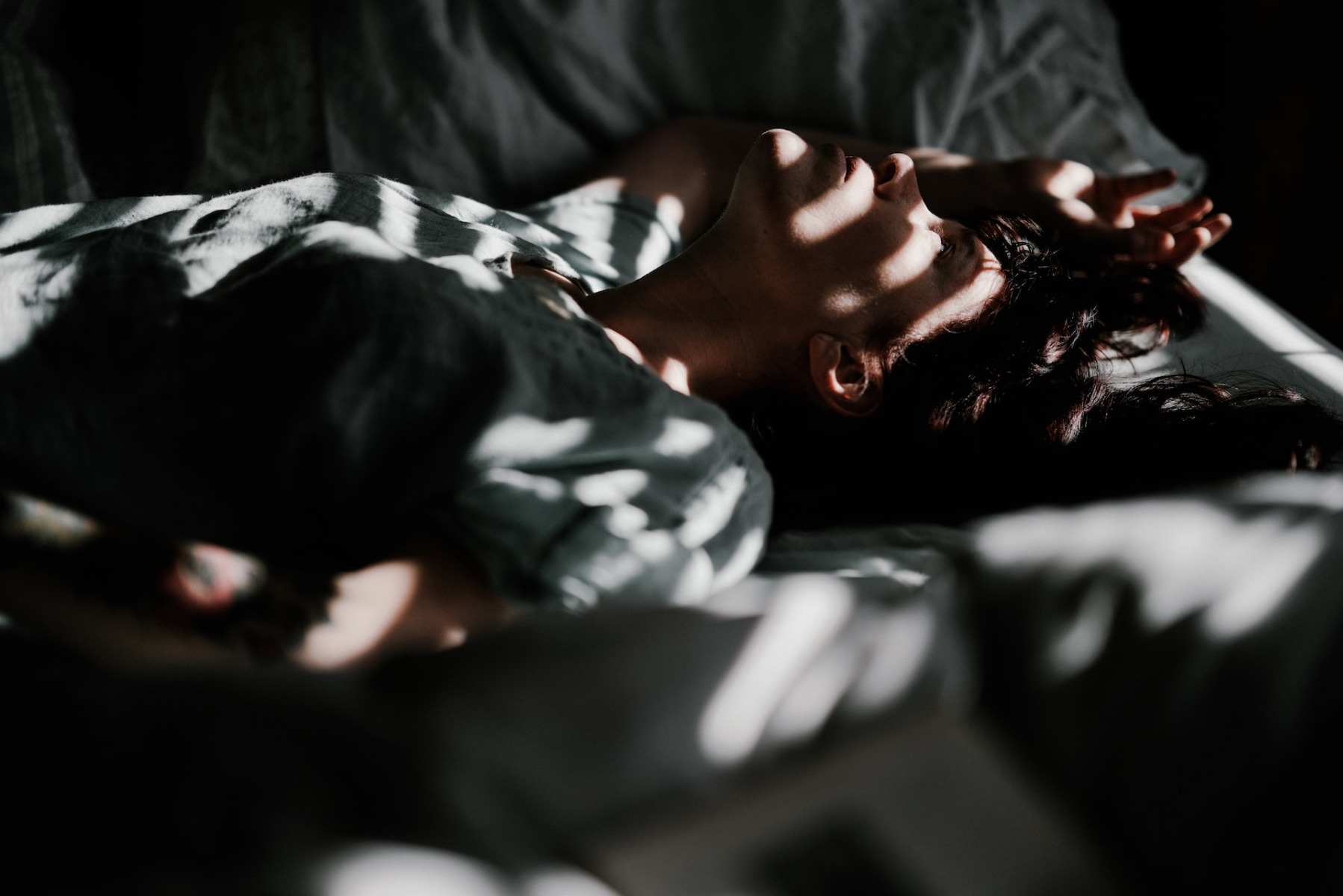
How does nocturia impact your sleep?
Nocturia can disrupt sleep cycles, inevitably impacting productivity and concentration the next day. Sleep allows your body to relax and recover during Rapid Eye Movement (REM) sleep; if you don’t get that, you will notice physical changes. If this continues, this can lead to a long-term pattern of sleep deprivation. Sleep deprivation can lead to sallow and pale skin, red and puffy eyes, irritability and anxiety, weight gain and even illnesses due to your body being unable to fight infection due to a compromised immune system.
While going to the toilet at night is incredibly common and does increase with age, that doesn’t mean you should accept it as part of your nightly routine.
7 ways to reduce the number of times you pee at night
There are steps you can take to reduce your trips to the bathroom at night and get a restful night’s sleep, so we have worked alongside our resident sleep psychologist, Dr Katherine Hall, who has shared her top tips.

1. Always sleep on your side
When it comes to sleeping positions, we recommend sleeping in the position that is most comfortable for you. Some positions encourage better sleep, while others do not. Nocturia is a very common symptom of obstructive sleep apnea (OSA). This can also impact your rest even further, as the walls of your throat relax too much, leading to irregular breathing.
There have been studies that have found a link between improving sleep apnea symptoms and improving overactive bladder symptoms, therefore reducing frequent trips to the toilet. One of the best positions for those with OSA and nocturia is to sleep on your side with your back straight. This will help open the airways and lead to more regular breathing, and it could reduce your trips to the toilet by improving those OSA symptoms.
This position also helps to keep your spine and neck aligned, essential for a good night's sleep and for reducing any neck pains you might get from front sleeping. Make sure that your mattress supports you throughout the night, as some mattress firmness levels are better for certain sleeping positions than others!
For those who are pregnant and sleeping on their left side, you can make this more comfortable by rolling up a blanket and placing it at the small of your back to relieve any pressure. If you have a spare pillow, you can also put this between your legs to make it easier to stay in this position.

2. Have a ‘lie down’ on your sofa before bed
The positions you keep your body in during the day can impact your trips to the bathroom. If you are upright most of the day and then lie flat when you go to bed, the fluid that has built up in your legs does not have the chance to drain and flow to the kidneys. So, if you go straight to bed, you will likely need a trip to the bathroom due to that fluid.
But, keeping your legs elevated before you go to bed allows that fluid to drain more effectively before you go to sleep, so, in theory, you would spend more time going to the bathroom during the day than at night.
Leg elevation also helps to reduce any swelling in your legs, feet and ankles if pregnant, which can occur due to fluid retention and hormonal changes, again helping to improve your sleep.
This tip was proven to work for a man who regularly experienced nocturia. After lying flat with his legs above heart level during the afternoon - for around an hour -, he started to notice improvements in his sleep. After continually doing this, his visits to the toilet reduced from seven times during the night to two visits or, sometimes, not at all.

3. Stop drinking water two hours before bed
Drinking water before bed can result in more trips to the bathroom than you would like - particularly if you are pregnant. If you can, avoid drinking water around two hours before bed. If you need water at night, try to take small sips and move your water out of sight, as that can encourage the need to go to the bathroom.
Instead, drink water during the day. If you struggle to balance your water intake, remember to drink with every meal and when you wake up. If you are drinking alcohol, try to drink water alongside this to stay hydrated.

4. Similarly, opt for chocolate in the morning to lower cortisol levels
Certain foods, including chocolate, can increase the need for the toilet. This can irritate your bladder, making you more likely to go to the bathroom. That’s not to say you have to avoid chocolate altogether but try to reduce your daily intake to protect your sleep and avoid eating them at night.
A study highlighted that chocolate in the morning resulted in lower cortisol levels compared to the group that ate chocolate in the evening. People with insomnia have been said to present high cortisol levels, resulting in poor sleep. You could try your daily chocolate in the morning to allow time for your body to digest it and track if it improves your sleep.
If you are pregnant and suffer heartburn, keep your head propped up while sleeping on your side to reduce the symptoms and ease yourself into sleep.

5. Use sleep affirmations to manifest a good sleep
Sleep affirmations can be a great distraction if you lie awake thinking about going to the bathroom.
Sleep affirmations are positive statements or phrases that a person repeats to themself before going to bed. By repeatedly saying these positive sleep affirmations out loud, they reprogram their subconscious mind to adopt more positive thoughts about sleep. This is because it ‘tricks’ your mind to focus on more positive thoughts and feelings regarding asleep, allowing people to have a more restful and rejuvenated sleep.
Some examples of sleep affirmations include:
- “I will get seven hours of sleep tonight.” (This is the recommended amount.)
- “I deserve a good night’s sleep and will not use the bathroom.”
- “My mind is calm, my eyes are tired, and my body is looking forward to resting tonight.”
The benefits are that you can improve your sleep quality as you feel calmer and more relaxed - increasing the likelihood of feeling rested enough to sleep and not visit the bathroom. But it can also help to stop anxious thoughts and increase your self-awareness, so you know what makes you feel good and bad.

6. The temperature of your bedroom could be waking you up
According to many studies, the temperature of your room is one of the most significant factors that can disrupt your sleep. The wrong temperature in your room can lead to decreased REM sleep and more time spent waking up than resting. So, it’s recommended that you sleep in a room with a temperature of around 20 degrees.
Anything hotter or colder can impact your body’s internal temperature changes during sleep. During the night, your core body temperature decreases and increases again during the wake phase. So, any significant changes in the temperature of your room can disrupt this and, therefore, impact your rest.
The tog of your duvet can also impact your sleep. As the weather gets warmer, you’ll feel hotter at night, so a thick duvet will make you uncomfortable, preventing you from falling asleep. Therefore, it’s essential to switch to a thinner duvet when the temperature is consistent, and we would recommend changing it once the temperature stays above 15°C at night over the space of a week.
As a general rule of thumb, we would say that a 4.5 tog duvet is suitable for use in temperatures between 16-20°C - the ideal temperature for your bedroom. However, personal preference, health conditions and whether you have air conditioning can also play a role in determining when to change to a 4.5 tog duvet.

7. Track your habits with a new diary
Disrupted sleep significantly affects your mental and physical health. And, if you frequently go to the bathroom at night and struggle to sleep or even get to sleep, why not start a sleep diary?
You must track your sleep routine, in addition to your nighttime awakenings, so that you can get to the root of the problem. Make sure to record the following:
- What you did before going to bed. Did you read a book? Scroll through your phone and then attempt to go straight to sleep? All of this will help improve your sleep routine in the future.
- What did you eat or drink before bed? At what point did you stop eating and drinking before bed?
- How many times you woke up during the night. Write down all the times you woke up, even if you didn’t need to go to the toilet.
Once you have enough of a record, you can create a better routine. If you notice that you go to the bathroom more after drinking tea before bed, you can eliminate this drink or choose to have it earlier.
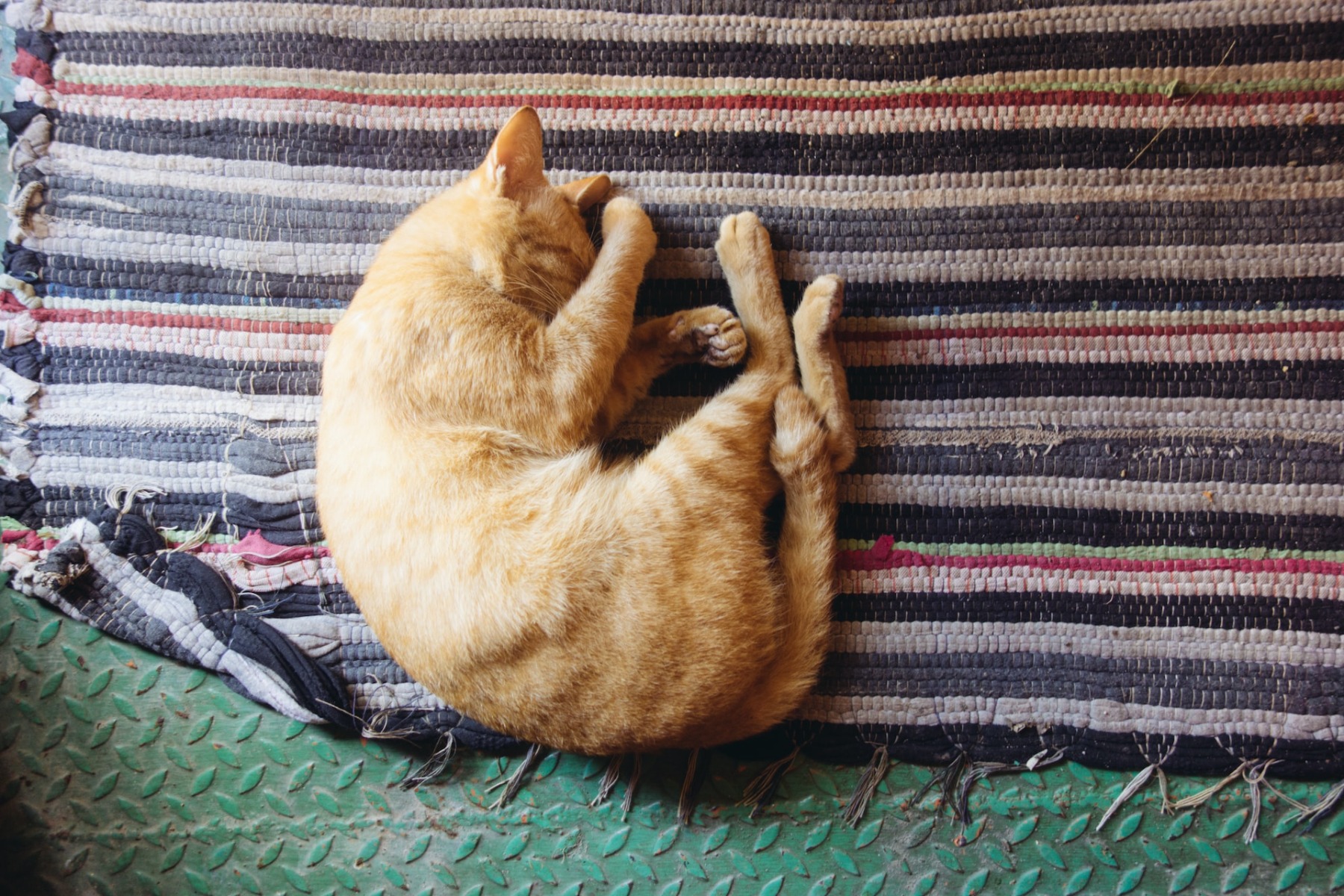
Are you sleeping better at night?
That being said, if your trips are becoming more frequent during the night, however, we suggest speaking to your doctor as nocturia can be a symptom of other conditions, and it’s always best to talk with a professional and put your mind at ease.
If you are looking for even more ways to improve your sleep and are struggling to drop off, read up on how you can improve your night if you have insomnia.


